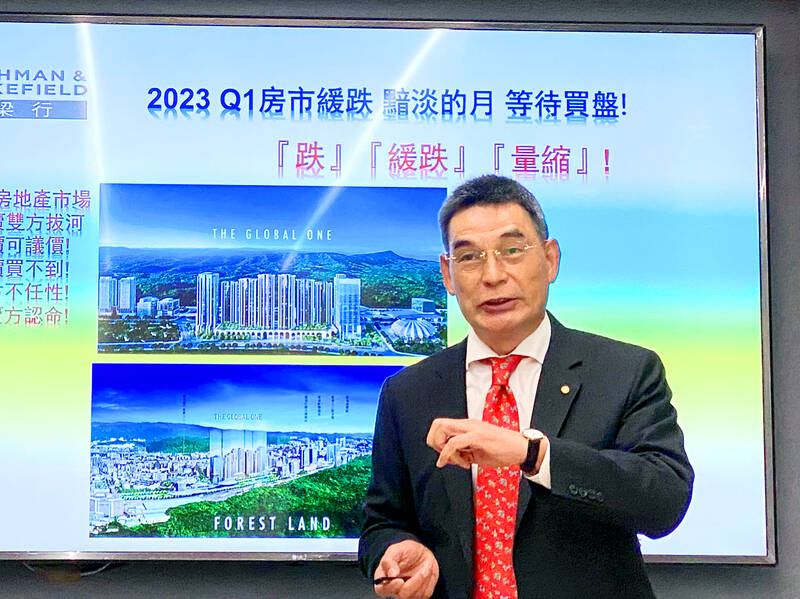Taiwan’s land, housing and hotel prices might need to fall 10 percent this year to spur buying interest, as an economic slowdown, monetary tightening and unfavorable legislation bode ill for transactions, Cushman & Wakefield Taiwan said yesterday.
“The property market is heading for a downturn in both transactions and prices, although some developers seek to push prices higher with their own capital,” Cushman & Wakefield Taiwan managing director Billy Yen (顏炳立) said.
The strategy would prove to be overreaching and impractical in light of a global economic slowdown and monetary tightening, Yen told a media briefing.

Photo: CNA
A liquidity-driven property boom plateaued in the first quarter of last year and has since lost steam, in line with interest rate hikes at home and abroad, he said, adding that the market cannot stay dynamic in the absence of sizeable capital injection.
Commercial property transactions shrank 17.6 percent year-on-year to NT$125.8 billion (US$4.1 billion) last year, while land deals plunged more than 40 percent to NT$171.8 billion, the property consultancy said.
Investment purposes drove 55 percent of commercial property transfers, the highest ratio in the past five years and outranking self-occupancy needs, it said.
Monetary tightening is dampening investment interest and bills that would ban transfers of presale housing contracts and subject unlisted companies to obtain regulatory approval before buying real estate could trigger panic selloffs and price corrections, Yen said.
Profits from property transactions on the part of companies are subject to income taxes of 20 percent, while individuals might pay up to 40 percent, depending on their income level. The gap has driven investors to set up companies to reduce taxes when trading real estate.
Yen said prices for commercial and residential properties would need to drop 10 percent to motivate potential buyers.
Hotels in popular locations have sought to increase their value through urban renewal, but properties in second-tier locations did not benefit and should display more pricing flexibility, Yen said.
Prices for storefronts would need to fall 20 percent to attract buyers, as physical stores are facing sharp competition from e-commerce firms, and rising operation and personnel costs, he said.
Yen said a 10 percent price correction would also apply to luxury housing units to motivate owners of multiple units to invest in them to hedge against inflation and investment risks.
“Players who do not have deep pockets better play safe in bad times,” Yen said.

The US dollar was trading at NT$29.7 at 10am today on the Taipei Foreign Exchange, as the New Taiwan dollar gained NT$1.364 from the previous close last week. The NT dollar continued to rise today, after surging 3.07 percent on Friday. After opening at NT$30.91, the NT dollar gained more than NT$1 in just 15 minutes, briefly passing the NT$30 mark. Before the US Department of the Treasury's semi-annual currency report came out, expectations that the NT dollar would keep rising were already building. The NT dollar on Friday closed at NT$31.064, up by NT$0.953 — a 3.07 percent single-day gain. Today,

‘SHORT TERM’: The local currency would likely remain strong in the near term, driven by anticipated US trade pressure, capital inflows and expectations of a US Fed rate cut The US dollar is expected to fall below NT$30 in the near term, as traders anticipate increased pressure from Washington for Taiwan to allow the New Taiwan dollar to appreciate, Cathay United Bank (國泰世華銀行) chief economist Lin Chi-chao (林啟超) said. Following a sharp drop in the greenback against the NT dollar on Friday, Lin told the Central News Agency that the local currency is likely to remain strong in the short term, driven in part by market psychology surrounding anticipated US policy pressure. On Friday, the US dollar fell NT$0.953, or 3.07 percent, closing at NT$31.064 — its lowest level since Jan.

The New Taiwan dollar and Taiwanese stocks surged on signs that trade tensions between the world’s top two economies might start easing and as US tech earnings boosted the outlook of the nation’s semiconductor exports. The NT dollar strengthened as much as 3.8 percent versus the US dollar to 30.815, the biggest intraday gain since January 2011, closing at NT$31.064. The benchmark TAIEX jumped 2.73 percent to outperform the region’s equity gauges. Outlook for global trade improved after China said it is assessing possible trade talks with the US, providing a boost for the nation’s currency and shares. As the NT dollar

The Financial Supervisory Commission (FSC) yesterday met with some of the nation’s largest insurance companies as a skyrocketing New Taiwan dollar piles pressure on their hundreds of billions of dollars in US bond investments. The commission has asked some life insurance firms, among the biggest Asian holders of US debt, to discuss how the rapidly strengthening NT dollar has impacted their operations, people familiar with the matter said. The meeting took place as the NT dollar jumped as much as 5 percent yesterday, its biggest intraday gain in more than three decades. The local currency surged as exporters rushed to